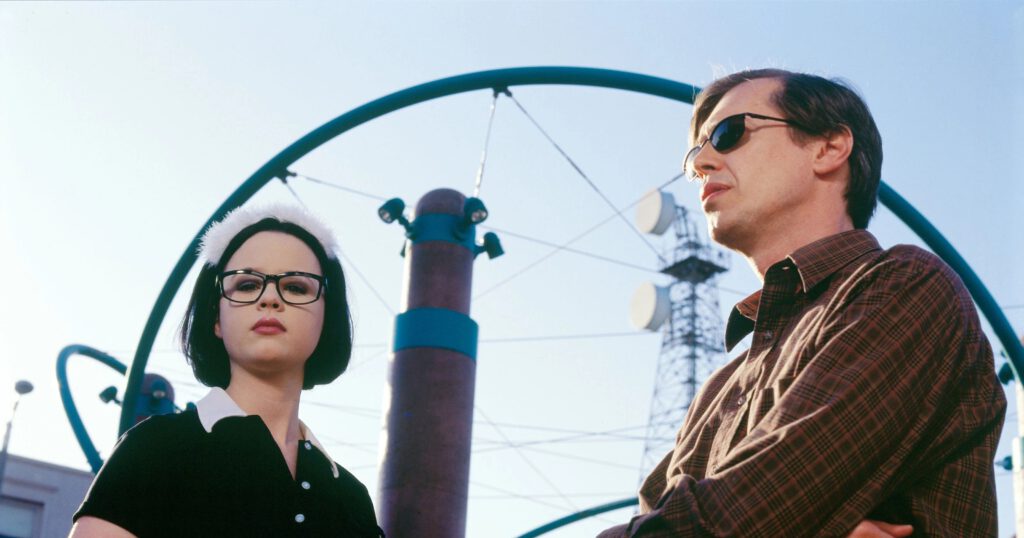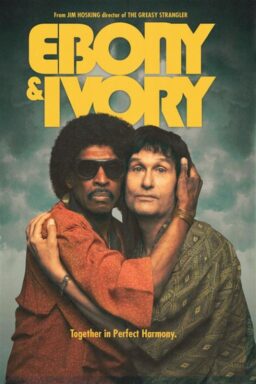I am fascinated with how Terry Zwigoff’s “Ghost World” has grown on me since I watched it for the first time around 15 years ago. At that time, I was a socially awkward graduate student who had been mostly happy and content with being surrounded by books and movies instead of people. I was mildly amused by the film’s dry sense of offbeat humor and observations of its lonely adolescent heroine’s angst from a safe distance. When I revisited “Ghost World” this year, I recognized some of that loneliness even though I’m now much older than the protagonist and her best friend.
For many adolescents, high school graduation is something to celebrate with joy and excitement before moving on to whatever will come next for them. But that is not the case for Enid (Thora Birch) and her best friend Rebecca (Scarlett Johansson). For both teenage girls, their high school graduation is another boring chapter of their suburban life in California. Although they are eager to get out of high school, Enid and Rebecca do not have much planned for the next chapter of their life. Sure, they promised themselves that they would get a job and live together after graduation, but neither has ever thought beyond that. They observe their plain and dull surrounding environment with ironic detachment and a bit of naughtiness. One of their usual entertainments comes from a dorky lad named Josh (Brad Renfro), and this poor guy always becomes a schmuck to Enid and Rebecca to tease whenever they drop by the local convenient store he works at.
One day, another opportunity for naughty fun comes when they spot a rather pathetic personal ad in a local newspaper. They decide to do a mean prank, which is how they encounter Seymour (Steve Buscemi). Right from when he enters a local restaurant where they are waiting for his appearance, this guy exudes that unmistakable aura of misery and loneliness. But Enid unexpectedly becomes quite interested in him, unlike her best friend, who disregards Seymour as another loser to watch from a distance.

We can easily discern why Enid is so fascinated with Seymour. After all, as a girl of specific cultural taste with her cynical sense of humor, she often feels alienated even when she hangs around with her best friend. We gradually gather that, despite their long friendship, Rebecca has stuck around Enid as a mere fellow outsider even though they do not share much between them besides their annoyance and frustration with their surrounding environment. Furthermore, Rebecca is ready to move forward, and we naturally sense more of the growing gap between her and Enid, who still fails to get stably employed, unlike Rebecca.
In Seymour, Enid finds someone who can be a better alternative for friendship because he is much lonelier than she is in many aspects. Whenever he is not working as an assistant manager in a local fast-food restaurant chain, he usually occupies himself with a vast collection of old LP records and other stuff in his residence. There is an amusing scene where Enid and Rebecca are at a loss while attending Seymour’s small private party full of his fellow LP record collectors.
Because Seymour has not had much luck or success in romance, Enid impulsively decides to help her new friend. To their little surprise, that leads to a fairly successful dating for Seymour. Needless to say, both Enid and Seymour subsequently find themselves in a tricky emotional circumstance later in the story. What eventually occurs between them is not exactly surprising to us. Still, the movie never lets their complex relationship be defined by mere attraction, and we come to empathize more with the aching need and confusion inside them.
“Ghost World” was Zwigoff’s first feature film after his two documentary films “Louie Bluie” (1985) and “Crumb” (1994), which is the vivid and fascinating presentation of the life, personality, and career of legendary American cartoonist R. Crumb. As a filmmaker who did not hesitate to delve into his old friend Crumb’s demons while also struggling a lot with his own—he told Roger Ebert that he was so agonized by his back pain during that time that he slept with a gun under his pillow for killing himself at any point—Zwigoff was surely the right director for the dark wit and melancholic sensibility of “Ghost World.” While many of the characters are not very likable, to say the least, their palpable personalities linger a lot more than expected. Even Enid’s hopelessly boring father (played by Bob Balaban) leaves a bit of an impression on us despite his sheer suburban banality.

The main performers of the film are pitch-perfect in their respective roles. As the film’s center, Thora Birch effortlessly embodies the angst and loneliness churning behind her character’s defiantly sardonic attitude, and her co-star Scarlett Johansson dutifully stands by. While the late Brad Renfro is solid as a lad a bit too slow for Enid and Rebecca, Illeana Douglas is hilarious as Enid’s summer art class teacher who unwisely puts the freedom of artistic expression above political correctness when Enid presents one of Seymour’s old stuffs which is quite controversial to say the least. Bob Balaban, Teri Garr, Dave Sheridan, Pat Healy, and David Cross are also enjoyable in their small but colorful supporting parts.
The film’s best performance comes from Steve Buscemi, who should have been Oscar-nominated at that time. (He received several major critics awards, including a Golden Globe nomination at least). While he can be a smart, ruthless gangster, as shown in the series “Boardwalk Empire,” this ever-dependable character actor is born to play losers and loners because of his naturally weary presence and how he is alternatively funny and poignant. Buscemi and Birch click with precise low-key comic timing whenever they are on the screen together, and you will not believe that he wanted to shed his character as soon as possible whenever the shooting was over.
“Ghost World” can be an acquired taste, but is still worthwhile for its excellent handling of story, mood, and character. I will not go into details on the finale. Still, I can tell you that I appreciate the sublime poetic quality of a brief but essential epiphany for Enid and how that beautifully leads to the tentative hopefulness of the following epilogue. Regardless of how her last shot in the film can be interpreted, you may sense that things might get better for her and Seymour. Despite their cynicism, you will care about what may be next for their lives, which is surely an achievement.











